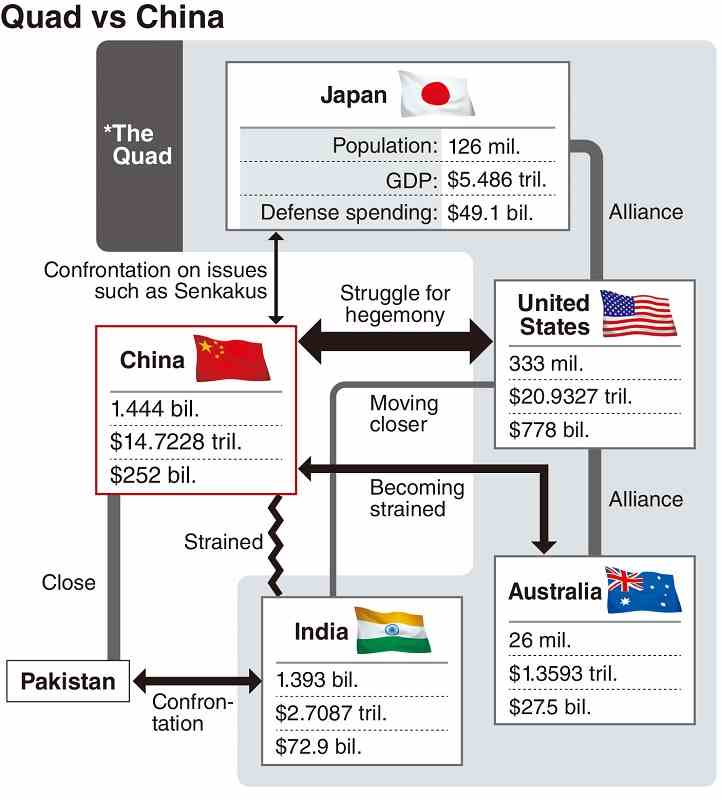
Sitting at desks in the inner circle are, left to right, Prime Minister Yoshihide Suga, Indian Prime Minister Narendra Modi, U.S. President Joe Biden and Australian Prime Minister Scott Morrison, during the Quad summit at the White House on Friday
16:03 JST, September 26, 2021
WASHINGTON/NEW DELHI — India held the key to reaching an agreement on the joint statement of the Quad summit in Washington on Friday.
The South Asian country had been reluctant to express a clear tone of creating a network to counter China, but fellow Quad nations Japan, the United States and Australia managed to gain India’s cooperation.
“In sum, we are four major democracies with a long history of cooperation. We know how to get things done, and we are up to the challenge,” U.S. President Joe Biden said at beginning of the Quad leaders summit.
Prime Minister Yoshihide Suga later added, “The Quad is an extremely significant initiative by four countries who share fundamental values, cooperating for the cause of realizing a free and open international order based on the rule of law in the Indo-Pacific.”
Biden’s emphasis on the Quad stems from the fact that China is increasingly challenging the existing international order and the U.S. status as the sole superpower is fading.
The combined gross domestic product of the Quad nations is more than double that of world No. 2 China, and their defense spending is nearly four times that of China, overwhelming the most populous country in terms of potential national power.
Scott Harold, deputy director of the Center for Asia Pacific Policy at the RAND Corporation, explained that the United States will not necessarily have to rely on other alliances if the Quad can solidify deterrence against China.
Closer to Washington
India, which has sought to pursue omnidirectional diplomacy, has so far rejected the idea of the Quad being seen as a military alliance, partly out of consideration for China, with which it shares a land border. It is said that India expressed reluctance at every turn to cooperate on the security front in the preliminary coordination of the joint statement.
However, with regard to cooperation in outer space, the U.S. side replaced the phrase “to tackle common threats” with “for peaceful purposes” just before the meeting, so they were able to start cooperation focusing on the sharing of satellite data.
As the U.S. side skillfully watered down the focus on security, in addition to the existing cooperation in advanced technologies, the statement was able to include cooperation in outer space and cyberspace, which are becoming increasingly important as new security areas.
India’s move to enhance the Quad is due to the growing threat of China to South Asia, where India considers itself the main power.
Indian troops clashed with Chinese troops in the disputed Kashmir region last June, and the two sides are continuing their standoff. The damage to India caused by cyber-attacks, which are believed to have been supported by China, has also become serious. An Indian government official revealed that the voices of caution about the Quad have grown weaker.
Pakistan, India’s hostile neighbor, has a close relationship with China through Beijing’s Belt and Road Initiative, which is putting pressure on New Delhi.
The withdrawal of U.S. troops from nearby Afghanistan is also a cause for concern.
The administration of Prime Minister Narendra Modi is believed to be aiming to maintain the presence of U.S. forces in the region by moving closer to the United States.

An Illustration : “Quad vs China,” Population based on United Nations Population Fund, 2021; GDP on International Monetary Fund, 2020; Defense spending on Stockholm International Peace Research Institute, 2020.
Leadership needed
Since the Quad is not a framework for directly dealing with military threats, the Biden administration is building its strategy toward China by integrating its cooperation with Japan, Australia and European allies.
When the U.S., Britain and Australia established the AUKUS security framework, it included a deal for Washington and London to provide Canberra with nuclear submarines. This provoked certain nations in Europe and members of the Association of Southeast Asian Nations, partly because of a lack of prior coordination.
Australian Prime Minister Scott Morrison tried to put out the fire, telling reporters after the Quad summit that the Quad particularly respects ASEAN.
To enhance the deterrence against China, U.S. leadership must mend the strained relationship with ASEAN and European nations and strengthen their unity.
Top Articles in World
-

Israeli Ambassador to Japan Speaks about Japan’s Role in the Reconstruction of Gaza
-

Videos Plagiarized, Reposted with False Subtitles Claiming ‘Ryukyu Belongs to China’; Anti-China False Information Also Posted in Japan
-

North Korea Possibly Launches Ballistic Missile
-

Chinese Embassy in Japan Reiterates Call for Chinese People to Refrain from Traveling to Japan; Call Comes in Wake of ¥400 Mil. Robbery
-

Russia: Visa Required for Visiting Graves in Northern Territories, Lifting of Sanctions Also Necessary
JN ACCESS RANKING
-

Japan PM Takaichi’s Cabinet Resigns en Masse
-

Japan Institute to Use Domestic Commercial Optical Lattice Clock to Set Japan Standard Time
-

Israeli Ambassador to Japan Speaks about Japan’s Role in the Reconstruction of Gaza
-

Man Infected with Measles Reportedly Dined at Restaurant in Tokyo Station
-

Videos Plagiarized, Reposted with False Subtitles Claiming ‘Ryukyu Belongs to China’; Anti-China False Information Also Posted in Japan
























